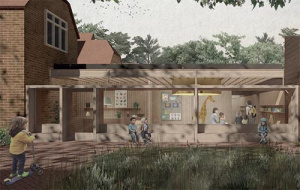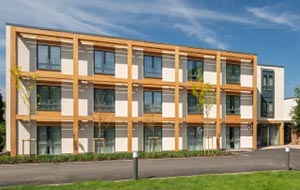Place-making: design for intergenerational living
 It is well-known that interaction between the generations improves well-being and mental health for both young and old, and that inter-generational living can help address loneliness. Yet we increasingly live and work in places where people of different ages are segregated from each other. Many younger people no longer see or interact with older people in their daily lives.
It is well-known that interaction between the generations improves well-being and mental health for both young and old, and that inter-generational living can help address loneliness. Yet we increasingly live and work in places where people of different ages are segregated from each other. Many younger people no longer see or interact with older people in their daily lives.
There has thus been a long interest in inter-generational communities, and their potential to support mutually beneficial interaction between generations. The UK established the Intergenerational Future All Parliamentary Party Group enquiry into Inter-generational policy and practice in 2009, leading to the Generations Togetherinitiative, a government sponsored series of inter-generational programmes in England.
The aim is to be inclusive, building on the positive resources that younger and older people have to offer each other and those around them. Supporting real intergenerational relationships, whereby students, children and older adults experience giving to and receiving from people who are not of their age group, enables social inclusion, enhances personal development and mitigates the discrimination, prejudice and isolation which is often present in our current age segregated lives.
 Univ North, with its Nursery, Residential Home and student accommodation, supported by a beautiful natural environment including rose garden, orchard, landscaped lawns, and allotments, with a gym, café, and large meeting space for events, will be linked by pathways across the site designed to encourage people flow but with space for people to stop, pause and interact. The site and its focal points will provide the structure to encourage, facilitate and support multi-generational interactions. Here is an opportunity to support an intergenerational community as it is designed, built and then lived in by different generations.
Univ North, with its Nursery, Residential Home and student accommodation, supported by a beautiful natural environment including rose garden, orchard, landscaped lawns, and allotments, with a gym, café, and large meeting space for events, will be linked by pathways across the site designed to encourage people flow but with space for people to stop, pause and interact. The site and its focal points will provide the structure to encourage, facilitate and support multi-generational interactions. Here is an opportunity to support an intergenerational community as it is designed, built and then lived in by different generations.
These interactions may well leverage young people’s enthusiasm for volunteering and similar contributions. It provides the opportunity to give an extra dimension to the Nursery experience for both the staff and children, and to enrich the lives of the older adults living in the Residential Home. The proposed built environment is the cornerstone. It creates a rich mixture of active and quiet spaces that people will want to spend time in, and one that will enhance personal contentment and mindfulness.
Indeed, while successful inter-generational places require commitment from those participating, something which will need to be curated and will evolve over time, an essential foundation for the development of these interactions is the place itself. Successful intergenerational spaces supporting intergenerational living requires a conducive space designed to encourage and support networks and interactions. By its very place-making and design the site will enable intergenerational living. Spaces which focus on satisfying real and clearly identified needs have a greater probability of being sustainable and, therefore, of producing a greater impact.
There is thus an opportunity to build into the very design and fabric of the Univ North site, those elements which will facilitate and enable the subsequent development of a successful intergenerational shared place.
This project has become even more vital since the Corona Virus outbreak which has bought into strong focus the need for intergenerational support and interaction. While we cannot know how the world will eventually pan out, many are now turning to ask how we may keep the good aspects of this strange new world. Importantly, the current sense of community which is emerging under the intense pressure of national lock-downs is leading to calls for new community structures: in particular, the coming together of different age groups usually segregated in work and residential spaces may engender more age integrated communities – Univ has an opportunity to build upon this with its new intergenerational community site.
 Professor Sarah Harper – Supernumerary Fellow in Gerontology; Professor of Gerontology; Co-Director, Oxford Institute of Population Ageing
Professor Sarah Harper – Supernumerary Fellow in Gerontology; Professor of Gerontology; Co-Director, Oxford Institute of Population Ageing
If you are interested in knowing more about multigenerational interaction in north Oxford, please email Gordon Cox (Gordon.Cox@univ.ox.ac.uk) for a more detailed paper, “Enhancing Community at University College North Oxford through Multigenerational Interactions”, written by Professor Sarah Harper and Dr Andrew Grant, Finance Bursar.
Published: 6 April 2020
